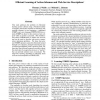Free Online Productivity Tools
i2Speak
i2Symbol
i2OCR
iTex2Img
iWeb2Print
iWeb2Shot
i2Type
iPdf2Split
iPdf2Merge
i2Bopomofo
i2Arabic
i2Style
i2Image
i2PDF
iLatex2Rtf
Sci2ools
AAAI
2008
2008
Efficient Learning of Action Schemas and Web-Service Descriptions
This work addresses the problem of efficiently learning action schemas using a bounded number of samples (interactions with the environment). We consider schemas in two languages-- traditional STRIPS, and a new language STRIPS+WS that extends STRIPS to allow for the creation of new objects when an action is executed. This modification allows STRIPS+WS to model web services and can be used to describe web-service composition (planning) problems. We show that general STRIPS operators cannot be efficiently learned through raw experience, though restricting the size of action preconditions yields a positive result. We then show that efficient learning is possible without this restriction if an agent has access to a "teacher" that can provide solution traces on demand. We adapt this learning algorithm to efficiently learn web-service descriptions in STRIPS+WS.
Related Content
| Added | 02 Oct 2010 |
| Updated | 02 Oct 2010 |
| Type | Conference |
| Year | 2008 |
| Where | AAAI |
| Authors | Thomas J. Walsh, Michael L. Littman |
Comments (0)

